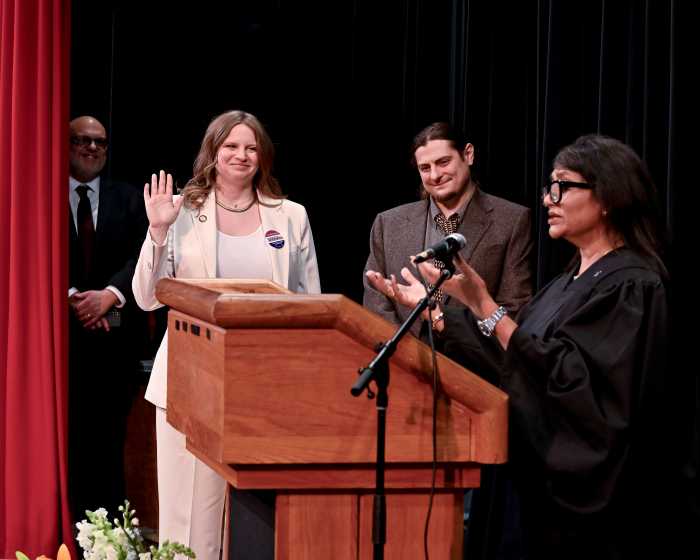Volume 5, Number 24 | June 15 – 21, 2006
POLITICS
A Lesbian Co-Parent’s Second Chance
Biological mother’s former partner may presumptively have rights
A California appellate panel ruled on June 9 that Charisma R., the co-parent of three-year-old Amalia Lynne, is entitled to a court hearing on whether her former partner, the child’s biological mother, could present evidence—specifically Charisma’s lack of such a biological tie—to rebut the co-parent’s presumed parental status.
The ruling is the first from an appellate panel to apply a new approach to co-parent rights that the California Supreme Court adopted last year.
Charisma is represented by the National Center for Lesbian Rights.
Charisma and Kristina S. began dating in 1997, began living together in 1998, and registered as California domestic partners in January 2002. They decided to have a child through donor insemination, and Kristina gave birth to Amalia Lynne in April 2003. The women gave Amalia Lynne a hyphenated last name combining their surnames. But the women’s relationship swiftly deteriorated, and Kristina moved out of their home in July 2003, taking Amalia Lynne with her.
According to the court’s opinion by Justice Linda M. Gemello, Kristina has allowed Charisma to see Amalia Lynne only twice since moving out, and refuses to give Charisma any parental rights.
Charisma’s suit seeking a declaration of parental rights was originally unsuccessful, Alameda County Superior Court Judge Dan Grimmer applying precedents valid at the time to find that a lesbian co-parent lacked standing to seek parental rights. This situation changed last August, however, when the state Supreme Court ruled in three decisions that same-sex co-parents could be treated as legal parents through a creative interpretation of California’s version of the Uniform Parentage Act, the nationwide model upon which states are urged to base their family law statutes.
The guidelines established in the lead case in last year’s state Supreme Court decision, Elisa B. v. Superior Court, focus on whether a co-parent has received the child into her home and publicly acknowledged the child as her natural child. If these conditions are met, the co-parent is presumed to be the child’s parent unless other facts in the case lead the court to conclude that it makes for “an appropriate action” to rebut that presumption—with evidence about the lack of biological ties.
The Supreme Court raised a particular concern about such a rebuttal resulting in the child having only one parent, which is contrary to the California “public policy favoring that a child has two parents rather than one.”
Justice Gemello found that Judge Grimmer had correctly applied existing precedents, but that they were no longer valid in light of the 2005 Supreme Court ruling. Rather than simply issue a declaration of parental rights in favor of Charisma, the appellate panel sent the case back to Grimmer for a new hearing. Given that Grimmer and the parties had not had the benefit of the Elisa B. ruling, the panel found that it would be appropriate to have evidence in the case presented anew in light of the 2005 rules.
Kristina argued that Charisma’s claim could be distinguished from the facts in Elisa B, in which the birth mother was not opposing a parental rights declaration—quite the opposite, she was asserting that her former partner had an continuing obligation to provide financial support for the child.
Gemello found this distinction irrelevant.
“Nothing in Elisa B. suggests that the preferences of the biological mother control the determination of whether presumed parent status arises,” she wrote. “We note that a rule that allowed the biological mother to unilaterally deny presumed parent status would potentially implicate the constitutional rights of the person seeking such status and the constitutional rights of the child in the establishment of the parent-child relationship.”
Ironically—and as an example of how significantly family law issues vary from state to state—in recent weeks a Florida appellate court, rejecting an attempt to establish parental rights by a lesbian co-parent, found the interests of the child to be essentially irrelevant. That finding is consistent with Florida’s generally anti-gay family law policies and contrasts sharply with the approach taken recently by California appellate courts.
This ruling was not the final word on whether Charisma is entitled to parental rights, so the court pointedly held back from addressing the question of whether Kristina’s constitutional parental rights would be violated by requiring that Charisma be allowed to re-enter her daughter’s life by court order.
gaycitynews.com



































